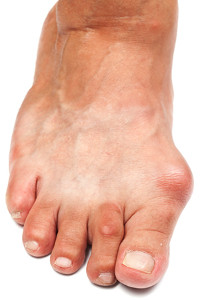Webster (281) 316-3338
Alvin (281) 331-3525
Webster (281) 316-3338
Alvin (281) 331-3525
 If you have a bunion, you may be experiencing uncomfortable foot conditions that may develop as a result of this ailment. The bony area that forms on the side of the big toe may lead to inflamed and callused skin, which may make walking difficult to accomplish, depending on the severity of the bunion. Research has shown the formation of bunions may be caused by genetic traits, in addition to medical conditions that may be present, which may include cerebral palsy or rheumatoid arthritis. Additionally, if you choose to wear shoes that are too tight, a bunion may gradually form, and proper treatment should begin as soon as possible. Bunions may be prevented by wearing shoes that fit correctly, leaving ample room for the toes to freely move about in. If you feel you have developed a bunion, it is suggested to speak with a podiatrist to learn about proper treatment techniques.
If you have a bunion, you may be experiencing uncomfortable foot conditions that may develop as a result of this ailment. The bony area that forms on the side of the big toe may lead to inflamed and callused skin, which may make walking difficult to accomplish, depending on the severity of the bunion. Research has shown the formation of bunions may be caused by genetic traits, in addition to medical conditions that may be present, which may include cerebral palsy or rheumatoid arthritis. Additionally, if you choose to wear shoes that are too tight, a bunion may gradually form, and proper treatment should begin as soon as possible. Bunions may be prevented by wearing shoes that fit correctly, leaving ample room for the toes to freely move about in. If you feel you have developed a bunion, it is suggested to speak with a podiatrist to learn about proper treatment techniques.
If you are suffering from bunion pain, contact Dr. Douglas Webb of Texas. Our doctor can provide the care you need to keep you pain-free and on your feet.
What Is a Bunion?
Bunions are painful bony bumps that usually develop on the inside of the foot at the joint of the big toe. As the deformity increases over time, it may become painful to walk and wear shoes. Women are more likely to exacerbate existing bunions since they often wear tight, narrow shoes that shift their toes together. Bunion pain can be relieved by wearing wider shoes with enough room for the toes.
Causes
Symptoms
In order to diagnose your bunion, your podiatrist may ask about your medical history, symptoms, and general health. Your doctor might also order an x-ray to take a closer look at your feet. Nonsurgical treatment options include orthotics, padding, icing, changes in footwear, and medication. If nonsurgical treatments don’t alleviate your bunion pain, surgery may be necessary.
If you have any questions, please feel free to contact one of our offices located in Alvin and Webster, TX . We offer the newest diagnostic and treatment technologies for all your foot care needs.
Read more about Bunions